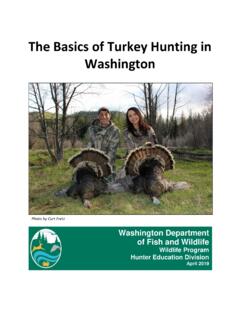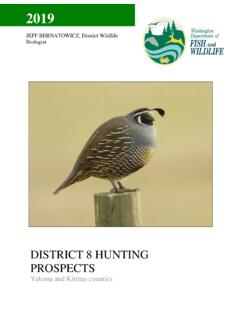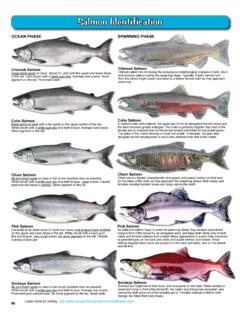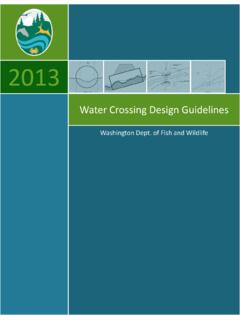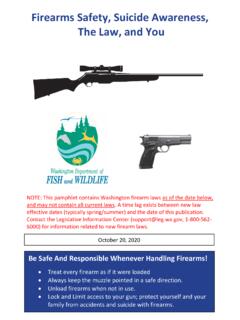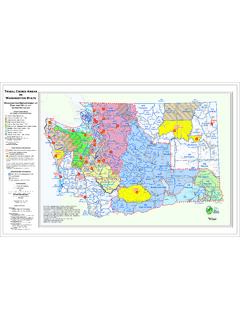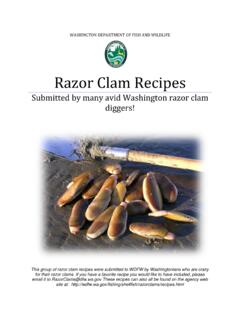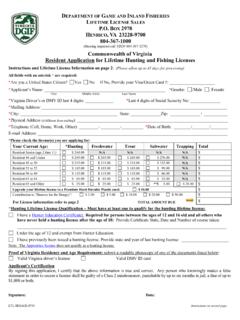Transcription of The Basics of Hunting Access in Washington
1 The Basics of Hunting Access in Washington Photos by Eric Wyatt, Chuck Lathrope, Ryan Driver, and Shari Brewer Washington Department of Fish and Wildlife Wildlife Program Hunter Education Division April 2019. 1. (This page intentionally left blank.). 2. Table of Contents Introduction .. 5. Types of 7. Public Lands .. 7. Private Lands .. 7. Tribal Lands .. 7. Access Passes .. 7. WDFW Vehicle Access 7. Washington Discover Pass .. 8. USFS Northwest Forest Pass .. 8. USFS Interagency Pass .. 8. Finding Access .. 8. WDFW Places to Go Hunting Web Page .. 9. Hunting Regulations Webmap .. 9. Navigating the Webmap .. 9. Header and Helpful Links .. 10. Zoom In/Zoom Out .. 10. Default 10. Current Location .. 10. Previously viewed information .. 10. Legend .. 10. Search for Hunts .. 11. Measurement 12. Location Search .. 12. Map Options .. 12. WDFW Private Lands Access 13.
2 Feel Free to Hunt .. 13. Register to Hunt .. 13. Hunt by Written 13. Hunt by 14. Landowner Hunting Permits .. 15. Asking for Private Lands Access .. 15. Hunter Education Training .. 17. Becoming a Hunter Education Instructor .. 17. Master Hunter Permit Program .. 17. 18. Ten Basic Safety Rules .. 19. It is your responsibility to know where you are. Don't trespass. Be responsible. Know before you go. 3. Refer to this helpful guide to understand the acronyms used in the booklet. Acronym Definition WDFW Washington Department of Fish and Wildlife WDNR Washington Department of Natural Resources BLM Bureau of Land Management USFS United states Forest Service USFWS United states Fish and Wildlife Service NPS National Park Service BOR Bureau of Reclamation RCW Revised Code of Washington RCO Washington Recreation and Conservation Office 4. Introduction This booklet will help you find Access to public and private lands in Washington State for Hunting purposes.
3 Hunting Access is one of the biggest concerns for hunters. In Washington , about 50% of the land is publicly owned and open to hunters and recreationists. These lands are managed by state or federal entities. State owned lands open to Hunting are managed by WDFW and WDNR. Washington State Parks also owns public lands, however Hunting is not allowed in state parks. Federally owned lands are managed by BLM, USFWS, NPS, USFS, BOR, etc. State and federal lands all have different land management mandates that affect when and where Hunting is permitted. WDFW owns and manages 33 wildlife areas throughout the state, totaling approximately one million acres. WDNR manages nearly million acres. Public lands are great places to hunt, watch birds, hike, and enjoy the outdoors. In addition to public land, more than 600 private landowners allow public Access on over one million acres of property for various outdoor recreation opportunities.
4 Photos by WDFW. 5. WDFW Wildlife Areas Public/Tribal lands 6. Types of Lands Public Lands Public lands are open to all members of the public. This is great news for outdoor enthusiasts in Washington because it guarantees that there will always be land open for outdoor recreation. These lands are typically owned by state or federal government agencies, but some are owned by cities and counties. Check the regulations for the different agencies to learn what their rules and regulations are, as some may not allow Hunting or other activities based on the agencies'. missions. Some agencies may also require an Access or parking pass. Private Lands Private lands are not publicly owned. These lands are generally off limits to the public, as private landowners have the right to prohibit Access to their property. Hunters can contact the county assessor's office for information on landownership for each land parcel in the county.
5 Please note that some parcels have a Limited Liability Company (LLC) or other entities listed as the owner, in which case ownership may be difficult to determine. Current state laws under RCW provide a lower tax rate for private forest land that is designated for timber production. However, the law does not state that public Access is a requirement. The best source of information for hunters is the private forest landowner who manages the property of interest. Tribal Lands Some tribal lands allow public Hunting , and there are generally additional fees or permits required to Access the property. Many of the open tribal lands are managed to provide additional Hunting Access for users. The best source of information for hunters is the tribal entity managing the property of interest. Access Passes WDFW Vehicle Access Pass This pass covers most day use fees on WDFW lands ONLY.
6 The pass allows the driver and any passengers in a private vehicle the use of the recreational areas. Additional fees may be charged at camp sites or other developed recreation sites. The Vehicle Access Pass is interchangeable between two vehicles. To be displayed, the pass must be visible from outside of the vehicle (placed on dash, hung from rear view mirror, etc.) so Enforcement personnel can verify that the vehicle is legally parked on lands managed by WDFW. For a list of locations requiring the Vehicle Access Pass, visit the WDFW web pages listed below: WDFW Wildlife Areas WDFW Water Access Sites 7. Washington Discover Pass This pass covers most day use fees on WDFW, WDNR, and Parks lands. The pass allows the driver and any passengers in a private vehicle the use of these recreational areas. Additional fees may be charged at camp sites or other developed recreation sites.
7 The Discover Pass is interchangeable between two vehicles. To be displayed, the pass must be visible from outside of the vehicle (placed on dash, hung from rear view mirror, etc.) so Enforcement personnel can verify that the vehicle is legally parked on lands managed by WDFW, WDNR, and Parks. For a list of locations requiring the Discover Pass, visit the Discover Pass website at USFS Northwest Forest Pass This pass covers most day use fees on National Forest lands in Washington and Oregon. The pass allows the driver and any passengers in a private vehicle the use of USFS recreational facilities. Additional fees may be charged at camp sites or other developed recreation sites. The Northwest Forest Pass is interchangeable between vehicles in the same household. To be displayed, the pass must be hung from the rear-view mirror of the vehicle. For more information on the Northwest Forest Pass, visit the USFS web page at USFS Interagency Pass This pass covers the purchaser nationwide at all USFS, BLM, BOR, NPS, and USFWS sites that charge entrance or standard amenity fees.
8 The pass has a signature line for two individuals who are then considered pass holders. The pass will admit pass holders and accompanying passengers in a private non-commercial vehicle. Please check with the agencies to determine how to display the pass. For more information on the Interagency Pass, visit the USFS web page at Finding Access Access can be very confusing and difficult if you don't know where to look. Some of the largest landowners in the state are WDFW, WDNR, and USFS. USFWS also has some locations that allow public Hunting throughout the state. WDNR has printed maps available for purchase, which are great resources for finding publicly owned properties throughout Washington . For more information about WDNR's maps, see the web page at and-services/buy-maps-aerial-photos-or-s urvey-data. For more information on public lands Access , refer to these agency websites: WDFW BLM WDNR NPS USFS BOR USFWS RCO Public Lands Inventory.
9 #Map 8. WDFW Places to Go Hunting Web Page The WDFW Places to go Hunting web page has helpful information regarding Hunting Access . You can also find information on: Hunting on private lands Hunting prospects WDFW owned wildlife areas Hunting Regulations webmap Game Management Units (GMUs). Hunting and wildlife viewing blinds Several other valuable resources Visit the Places to go Hunting page at Hunting Regulations Webmap The Hunting Regulations Webmap provides users with a different way to review the Hunting regulations. Users can explore regulations data by either selecting criteria for a search or clicking on the map to find out what hunts are available for their selected hunt type. In addition, it has the capabilities to look at public/private ownership, show private lands Hunting opportunities, map water Access sites, and display satellite imagery. The data shown in this webmap are an extension of the printed PDF pamphlet.
10 For complete rules, see the current WDFW Hunting regulations. This tool is also available for use on smart phones. You can Access the webmap at Navigating the Webmap To start using the webmap tool, you must first become familiar with the controls. The webmap has several sections that control how the map displays information to the user. These sections are: Header and Helpful Links Zoom In/Zoom Out Default View Current Location Previously viewed information Legend Search for Hunts Measurement Tool Location Search Map Options 9. Header and Helpful Links The Header and Helpful Links section may display as text or as just the WDFW Logo on the top of the application. If no text is displayed, select the WDFW logo to expand the menu. The display depends on the internet browser. The menu has eight options: 1. WDFW Home Opens the WDFW home page 2. WDFW WLAs Opens the WDFW Wildlife areas (WLAs) webpage 3.
